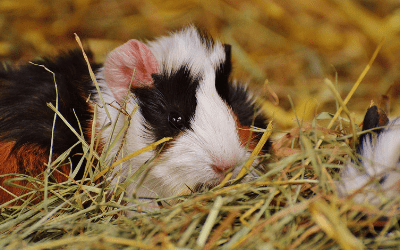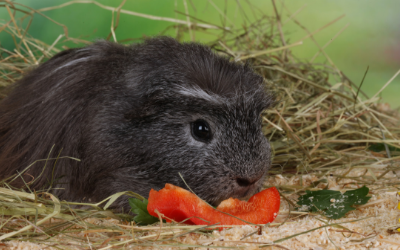Best Food to Feed My Guinea Pig
Guinea pigs, like rabbits, are true herbivores, although the physiology and function of their gastrointestinal system is not as well understood as the rabbit. Guinea pigs develop food preferences early in life and do not take to changes in food types, appearances, or presentation easily. Sudden changes can result in a refusal to eat. Any modifications to the diet should be made gradually. The most critical aspect of the diet of guinea pigs is their requirement for vitamin C. Apart from that, the key to a healthy diet in a guinea pig is unlimited amounts of hay. 
"Hay is critical not only to help wear down their continuously growing teeth, but also to keeping the bacteria in their intestinal tract that ferment their food healthy."
The wild guinea pig, in its native habitat of the South American forests, eats a variety of foods, everything from fruits to leaves and plants to root vegetables, but especially a lot of high-fiber grasses. Pet guinea pigs are often fed a dry guinea pig mix with the occasional bit of fresh vegetables, which is inadequate in fiber and generally too high in carbohydrates. Hay is critical not only to help wear down their continuously growing teeth, but also to keeping the bacteria in their intestinal tract that ferment their food healthy.
What should I feed my guinea pig?
The preferred basic diet for guinea pigs is unlimited amounts of Timothy or other low-calcium hay, supplemented with smaller amounts of a commercial, high-fiber, Timothy-hay based guinea pig pellets. Vitamin C (see below) should be given each day. Hay should be offered free-choice throughout the day. Hay and pellets should be supplemented with a variety of fresh, well-washed, leafy greens or colored vegetables (especially those high in vitamin C, such as bell pepper, tomato, and asparagus).
Other good choices for vegetables include green and red leaf lettuce, Romaine lettuce, broccoli, cauliflower, endive, kale, carrot tops, beet greens, cilantro, carrot, and squash. Iceberg or head lettuce has little nutritional value and is mostly water, so it should not be offered.
"The preferred basic diet for guinea pigs is unlimited amounts of Timothy or other low-calcium hay, supplemented with smaller amounts of a commercial, high-fiber, Timothy-hay based guinea pig pellets."
Fruit should also be limited, as feeding too much of their high sugar content may lead to an imbalance of intestinal bacteria and may cause serious and potentially life-threatening diarrhea. Some preferred fruits to offer occasionally include those high in vitamin C such as small amounts of orange (citrus) and kiwi or high fiber fruits such as pear and apple. Oats, seeds, nuts, and dry cereals should be avoided, as they are too high in carbohydrates and fat.
Fresh, clean water should be freely available. Sipper bottles must be cleaned daily, and their tubes should be checked for obstructions in the tips. Water bowls are often not practical, as guinea pigs often soil their water with food or feces or knock bowls over. Food bowls should be heavy enough such that they are hard to tip over.
Why do I need to give my guinea pig Vitamin C? 
Guinea pigs and primates, including humans, cannot manufacture their own vitamin C, therefore it is essential to supplement their diet with vitamin C. Vitamin C is vital for the normal development and maintenance of skin, joints, and mucosal surfaces, like gums. It also plays an important role in the healing of wounds. A lack of vitamin C makes the body more prone to other diseases, including infections and predisposes guinea pigs to skin problems. A guinea pig that has a rough hair coat, is off food, has diarrhea, is reluctant to walk, perhaps appears to be painful, has swollen feet or joints, or has hemorrhages and ulcers on its gums or skin, is likely to be deficient in vitamin C and should be seen by your veterinarian as soon as possible.
"A lack of vitamin C makes the body more prone to other diseases, including infections and predisposes guinea pigs to skin problems."
Guinea pigs need 10-50 mg vitamin C per day, depending on the condition of the animal (young, old, stressed, healthy, pregnant). Your veterinarian can tell you exactly how much vitamin C your guinea pig requires. While vitamin C is readily available from fresh fruit and green or colored vegetables, guinea pigs cannot consume enough produce every day to get the vitamin C they need. Also, while guinea pig pellets contain vitamin C, it is a relatively unstable compound that breaks down or oxidizes quickly. Therefore, be sure that your guinea pig pellets are used up or replaced within 90 days of the date of manufacture, or the vitamin C in them may be degraded. All guinea pigs should receive a vitamin C tablet or liquid vitamin C directly by mouth every day, rather than in their drinking water, since the vitamin also breaks down rapidly in water and loses its potency.
In summary, an unlimited quantity of hay, a smaller amount of vitamin C-fortified pellets, plus a variety of fresh produce is extremely important to maintain your guinea pig's health. Have your guinea pig checked annually by your veterinarian with whom you can discuss your guinea pig's specific dietary needs.
Source: https://vcahospitals.com/know-your-pet/guinea-pigs-feeding
0 Response to "Best Food to Feed My Guinea Pig"
Post a Comment